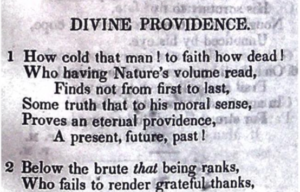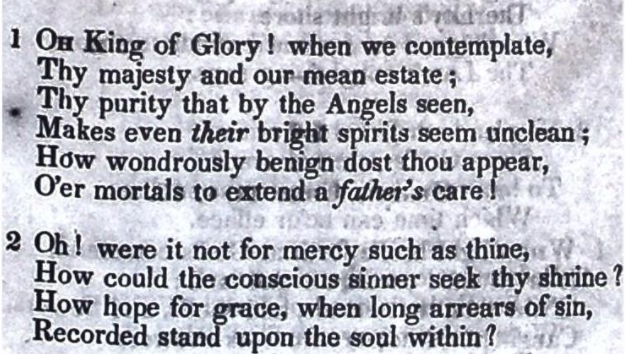Contributor(s): Shared on: 20 October 2021 under the Creative Commons Zero (CC 0) Universal license a Public Domain dedication Categories: Tags: | Contribute a translation | Source (English) |
|---|
|
How cold that man! to faith how dead!
Who, having Nature’s volume read,
Finds not, from first to last,
Some truth that to his moral sense
Proves an eternal providence
A present, future, past. | |
Below the brute that being ranks,
Who fails to render grateful thanks,
When he creation scans;
Where mountains lift their heads sublime,
Gray witnesses from elder time,
Of Wisdom’s mighty plans. | |
Where forests wave, and oceans flow,
And light sheds an impartial glow,
Like that of mercy’s rays;
Where gentle flowers yield their sweets,
And ev’ry warbling bird repeats.
Instinctive notes of praise. | |
Yet such there are in human kind,
Whose souls to worldly claims resigned,
With apathy behold;
Not only blossoms, hills and streams,
But heaven with its starry beams
Of incorruptive gold. | |
Blind pilgrims these who grope their way,
Without a guide their steps to sway,
Until a sudden fall
Reminds them, when perhaps too late,
Of those vicissitudes of fate
Which for religion call. | |
Oh! then will startled conscience seek,
Peace with an angry God to make,
And lips will move in prayer;
Gracious and long-enduring Lord!
Pardon e’en then wilt thou accord,
If Man but proves sincere. |
“How cold that man! to faith how dead!” by Penina Moïse, was published in 1842, and appears under the subject “Divine Providence” as Hymn 8 in Hymns Written for the Service of the Hebrew Congregation Beth Elohim, South Carolina (Penina Moïse et al., Ḳ.Ḳ. Beth Elohim, 1842), pp. 13-14. –Aharon Varady Source(s)
 Ḳahal Ḳadosh Beth Elohim (Hebrew: קהל קדוש בית אלהים, also known as Ḳ.Ḳ. Beth Elohim, or more simply Congregation Beth Elohim), founded in 1749 in Charleston, South Carolina, is one of the oldest Jewish congregations in the United States. The founding members of the synagogue were Jews of Spanish and Portuguese descent (Sepharadim), who arrived into Charleston via London, England. Before 1830 Ḳahal Ḳadosh Beth Elohim was a place of worship for Spanish and Portuguese Jews using Portuguese rituals as done in Portugal before the Spanish and Portuguese inquisitions. A splinter group animated by the European Reform movement, the Reformed Society of Israelites, formed in 1824. While at first this group did not succeed in reforming Beth Elohim, by the mid 1830s Beth Elohim had reabsorbed its members and its ḥazzan, Gustavus Poznanski (1804–1879), joined the Reform camp in 1840. After the first synagogue building was destroyed by fire in 1838, it was rebuilt two years afterward (in a Greek Revival style designed by Cyrus L. Warner) with an organ to the chagrin of the traditionalists. Ḳahal Ḳadosh Beth Elohim is recognized as the oldest Reform Jewish congregation in the Americas.  Penina Moïse (1797-1880) was born to a large and wealthy family in Charleston, South Carolina, the progeny of her merchant father, Abraham Moïse (1736-1809), originally from Strasbourg in Alsace, France, and her mother Sarah from the Jewish community on the Caribbean island of Sint Eustatius in the Netherlands Antilles. Her brother, also named Abraham, was a leader in the Reformed Society of Israelites, and so we imagine she was closely associated with the reformist wing of the congregation it wished to and ultimately succeeded in reforming, Ḳ.Ḳ. Beth Elohim. Moïse wrote at least 187 prayers for Beth Elohim's hymn books published in 1842 and in 1856. Moïse was also a gifted teacher and, in 1845, became head of Beth Elohim’s religious school. Moïse was a prolific writer, earning praise for her 1833 collection of poems, Fancy’s Sketch Book, as well as her articles for various newspapers across the country. After the Civil War, she returned to Charleston and ran an academy with her sister and niece. Though her eyesight eventually deteriorated into blindness, she continued to work and write until the end of her life. (This short biographical sketch includes material adapted from her entry in the Jewish Women's Archive by Jay M. Eidelman.) Aharon Varady (M.A.J.Ed./JTSA Davidson) is a volunteer transcriber for the Open Siddur Project. If you find any mistakes in his transcriptions, please let him know. Shgiyot mi yavin; Ministarot naqeni שְׁגִיאוֹת מִי־יָבִין; מִנִּסְתָּרוֹת נַקֵּנִי "Who can know all one's flaws? From hidden errors, correct me" (Psalms 19:13). If you'd like to directly support his work, please consider donating via his Patreon account. (Varady also translates prayers and contributes his own original work besides serving as the primary shammes of the Open Siddur Project and its website, opensiddur.org.) Read a comment / Leave a comment (moderated) Works of related interest: |












Leave a Reply